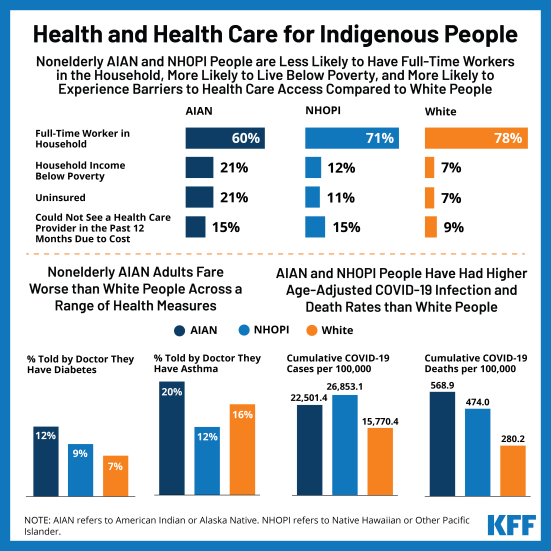Health and Health Care for Indigenous People
November marks National Native American Heritage Month, during which the U.S. recognizes the culture, heritage, and contributions of Indigenous people including those from American Indian, Alaskan Native, Native Hawaiian, and Pacific Island communities. As the country celebrates Indigenous knowledge and cultures, it is key to recognize that Indigenous people face many socioeconomic and health disparities that limit their overall health and well-being.
In the U.S., there are over 8.6 million people who identify as American Indian and Alaskan Native (AIAN) alone or in combination with another race/ethnicity and close to 700,000 people who identify as Native Hawaiian and other Pacific Islander (NHOPI) alone or in combination with another group. Within these groups 1.7 million people identify solely as AIAN and 550,000 people identify as NHOPI alone. The combined population of AIAN and NHOPI people has grown 45% over the last decade, from 6.4 million in 2010 to almost 9.3 million in 2021.
The U.S. has a responsibility to provide certain rights, protections, and services to AIAN people, including health care. However, the Indian Health Service has historically been underfunded to meet the health care needs of AIAN people and they face other social and economic challenges that contribute to poor health outcomes. NHOPI people also face systemic challenges to health. Nonelderly AIAN and NHOPI people are more likely to be uninsured than their White counterparts and nonelderly AIAN and NHOPI adults are also more likely than their White counterparts to postpone or forego seeking health care due to cost being a barrier. In addition, AIAN and NHOPI households are less likely to have a full-time worker and more likely to be poor compared with White households.
Reflecting these and other challenges, AIAN people fare worse than their White counterparts across a range of health measures, including being more likely to report fair or poor health (24% AIAN vs. 12% NHOPI vs. 12% White) and having chronic conditions like asthma and diabetes. NHOPI people do not fare worse than their White counterparts across some of these measures, but this may mask differences among this diverse community and/or more limited access to providers to diagnose chronic conditions. It may also reflect limitations in the ability to reliably capture their experiences in survey data due to their small population size. AIAN people also face challenges with mental health, including high rates of death by suicide and drug overdose deaths, which rose over the past few years amid the pandemic. Separate data for NHOPI people was not available for these measures. Moreover, COVID-19 has taken a disparate toll on AIAN and NHOPI people, with them experiencing higher age-adjusted rates of cases and deaths compared to White people.
Addressing the health and social challenges faced by Indigenous people will be important for fulfilling the nation’s duties and responsibilities, improving the health and well-being of this diverse and growing population, and supporting overall improved health and prosperity in the U.S. As part of these efforts, it will be important to resolve persistent gaps and limitations available in data to understand their health and health care experiences. The Biden Administration recently made large investments to address the COVID-19 pandemic and improve infrastructure in Native communities. A continued focus on addressing their health and health care needs will be important going forward.
Source
KFF analysis of 2021 American Community Survey, 1-yr Estimates; 2021 Behavioral Risk Factors Surveillance System Data; Centers for Disease Control and Prevention, COVID-19 Response, COVID-19 Case Surveillance Public Use Data, released on October 6, 2022; and National Center for Health Statistics, Provisional COVID-19 Deaths by HHS Region, Race, and Age, as of October 26, 2022.

